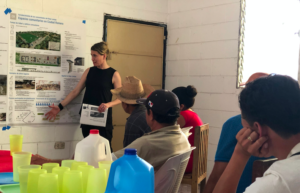
Rachel Berney is an Assistant Professor in the Department of Urban Design and Planning, Adjunct Assistant Professor in Landscape Architecture, an Urban@UW Fellow, and author of Learning from Bogotá: Pedagogical Urbanism and the Reshaping of Public Space. Her primary interests include community sustainable design, public space, and international development in the Americas, as well as urban design and planning history and theory with an emphasis on social and cultural factors. Urban@UW sat down with her in 2019 to discuss her work and research at UW and beyond; this story was shared with CBE as a Spotlight.
What urban challenges does your work address?
Some of the challenges I try to address are a lack of focus in urban design around justice and equity and the fact that we need to be moving much more directly towards that agenda. Environmental degradation and how cities inhabit their landscapes is another really big issue. I’ve done a lot of work in the Global South and I’ve been really interested in bringing what we call southern examples, Southern Urbanism, into the canon of design thinking in the North, to complicate it in a beneficial way. I think there’s a lot of opportunity to kind of cross-interrogate; what’s a problem in one place might suggest a solution in another place, and vice versa.
What would you say, today, right now, is the biggest urban issue?
Racism, and what we do to address it and mend it. Obviously racism can be an issue anywhere, it’s not just tied to cities. But cities definitely bring a lot of different people together, and that can create exciting opportunities but it can also create friction. I think that there’s also a lot of opportunity in government, and in what universities are doing in cities to breakdown institutionalized racism. Cities are also the sites of long-standing injustices: like neighborhoods that haven’t received the investment they need, like the Duwamish River being polluted and still not taken care of, communities experiencing redlining and not being able to catch up in terms of wealth-creation, that sort of thing. But for all the problems in cities, we’re all here at this public university, studying, teaching, and researching, so we should be able to provide some substantial solutions moving forward, and I think that we have a responsibility to work with others to do this.